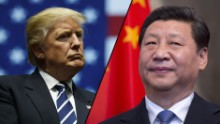Story highlights
- Chinese state media says US relationship affected by "negative factors"
- Speaking in Seoul, Obama described North Korea as a "hard problem"
(CNN)China's leader Xi Jinping said that ties with the US have been strained by "some negative factors" in a telephone conversation with President Donald Trump Sunday.
The call came at the end of a tense week in US-China relations, which analysts said signaled the end of honeymoon period between the two superpowers that began with a summit at Trump's Mar A Lago resort in April.
"Xi Jinping stressed that since his meeting with President Trump, important results have been achieved in China-US relations," reported Chinese state media outlet CCTV.
"Meanwhile, bilateral relations have also been affected by some negative factors, for which the China side has expressed its position to the US side."
The White House statement was more reticent, saying only that the two leaders discussed a range of issues of mutual interest including North Korea and trade relations.
US President Trump also spoke to Japanese Prime Minister Shinzo Abe by phone, with the two pledging deeper cooperation on North Korea, in the wake of growing frustrations over the rogue state.
Just two days ago, Trump declared US patience with North Korea was "over."
Bromance over?
Relations between China and the United States had warmed up after the two leaders met in February, with Trump even describing Xi as a "terrific person."
But in the past week, a $1.4 billion arms sale to Taiwan, which Beijing regards as a renegade province, was approved after months of delay, the same day as China's Dandong bank was sanctioned by the US for alleged ties to North Korea.
The US also labeled China as one of the world's worst human traffickers and challenged Beijing in the South China Sea, by sailing close to a disputed island chain that China claims.
Many took these moves as evidence of the US pursuing a harder line on the Asian superpower, likely caused by mounting frustration over a perceived lack of action by Beijing to contain North Korea.
On June 21, Trump sent a tweet in which he said Chinese efforts on North Korea, while appreciated, had "not worked out."
Leaders agree on North Korea
In conversations with Xi and Abe Sunday, Trump agreed with both leaders that efforts needed to be made to avoid conflict on the Korean Peninsula.
According to the White House statement, Trump raised the growing threat of North Korea's nuclear and ballistic arsenals with the Chinese president.
"Both leaders reaffirmed their commitment to a denuclearized Korean Peninsula," the White House said in a readout of the phone call.
In his conversation with Prime Minister Abe, the White House said Trump reiterated the US was ready to defend Japan in the event of any North Korean aggression.
"The two leaders exchanged views on the growing threat from North Korea, including their unity with respect to increasing pressure on the regime to change its dangerous path," the White House readout said.
Obama on North Korea: 'It's a hard problem'
As Trump was speaking with Xi and Abe, his predecessor, former US President Barack Obama, was speaking in South Korea about the difficulties of dealing with North Korea.
"The first thing to stipulate is this is hard, it's a hard problem," Obama said during remarks at the Asian Leadership Conference in Seoul.
"In North Korea you have a government that is unmatched in its repression of its people ... You have a young man who is only interested in maintaining power and is willing to do anything to sustain that."
Obama said North Korea's future prosperity would not come "from the pursuit of nuclear weapons."
"The future belongs to those who build, not those who are committed to destroy... so long as it remains outside of the world order, they should face consequences."


